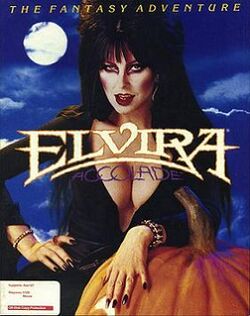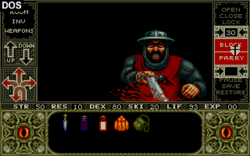Software:Elvira: Mistress of the Dark (video game)
| Elvira: Mistress of the Dark | |
|---|---|
 Cover art for the Atari ST | |
| Developer(s) | Horror Soft |
| Publisher(s) | Accolade |
| Designer(s) | Alan Bridgman Keith Wadhamsa Michael Woodroffe Simon Woodroffe |
| Artist(s) | Paul Drummond Michael Landreth Philip Nixon |
| Composer(s) | Dave Hasler |
| Engine | AberMUD (modified) |
| Platform(s) | Amiga, Atari ST, Commodore 64, MS-DOS |
| Release | March 1990[1] |
| Genre(s) | Adventure, role-playing |
| Mode(s) | Single-player |
Elvira: Mistress of the Dark is a horror adventure/role-playing video game developed by Horror Soft and released by Accolade in 1990 for the Amiga, Atari ST, Commodore 64 and MS-DOS computers. It was Horror Soft's second published game after 1989's Personal Nightmare and stars the actress Cassandra Peterson as her character Elvira.
In Mistress of the Dark, Elvira is held captive by dark forces in the castle of her ancestor, Lady Emelda. The player's character is to enter the castle to rescue Elvira and prevent the imminent return of the long-dead evil sorceress. The well-received game was followed by Elvira II in 1991 and the spiritual successor Waxworks in 1992.
Plot
The game begins following events of the 1988 film Elvira, Mistress of the Dark. After the death of her evil Uncle Vincent, Elvira has inherited Killbragant Castle and has restored it to its former glory, planning to turn it into a tourist attraction for horror fans. However, while doing this, Elvira has inadvertently awakened a horde of monstrous followers of her distant ancestor, the powerful wicked witch Emelda. The monsters imprisoned Elvira in the castle and began preparations to use her for the return of their mistress. The player's character has been called upon to help by Elvira to help her prevent Emelda's resurrection. The evil sorceress died centuries ago before she could take over and rule the world, but has made a pact with the devil to be brought back to life in the future. In the beginning of the game, the player is captured by the sorceress's undead minions. He is then rescued by Elvira and asked to help get her powers back, and to find a way to send Emelda back to hell before it is too late.[2][3][4][5][6][7]
Gameplay
Elvira is a mix of first-person shooter role-playing game and point-and-click adventure game. The player will navigate around a castle and its grounds sent by Elvira to find six special keys to retrieve a magical dagger and scroll to kill Lady Emelda. In the exploration mode, the player will be able to traverse a room/passage at four different angles. In each angle the player can make use of ten verbal commands to pick up items, interact with objects or use items on objects. Puzzles are solved by using some items in correct situations. The player can be killed if incorrect procedures are done or face hostile encounters unprepared.
When faced with an enemy, the gameplay mode will switch to combat mode. How well the player does defeating an opponent, depends on various conditions. Strength increases damage done, Resilience helps the player withstand damage, Dexterity increases the chance to hit the opponent, Skill helps the player make better use of weapons and shields and Life is how many hit points the player has before being killed by an enemy. Better swords and shields improve the player's fighting and defensive abilities. When attacking an enemy, the player must choose and time well a hack or slash attack. When defending from enemy blows, the player must choose and time well a block or parry move to avoid taking damage. Killing an enemy raises both experience and statistics.
Reception
| Reception | ||||||||||||||||
|---|---|---|---|---|---|---|---|---|---|---|---|---|---|---|---|---|
| ||||||||||||||||
| ||||||||||||||||
Elvira was well received by critics. Leah Wesolowski of Computer Gaming World in 1991 praised the game's graphics and music, stating that it was, "like its namesake, something to notice for many of us."[12] Scorpia in 1991 and 1993 praised the graphics, stated that it was not easy, and concluded that "it's definitely worth playing".[13][14] Elvira won the magazine's 1991 Role-Playing Game of the Year award.[11]
See also
References
- ↑ Elvira: Mistress of the Dark - Rolling Demo
- ↑ 2.0 2.1 Zzap! 71 (March 1991), pages 68-69.
- ↑ 3.0 3.1 3.2 Raze 5 (March 1991), pages 70-71
- ↑ Compute 131 (July 1991), page 108.
- ↑ "CU Amiga Previews - Elvira". CU Amiga (EMAP) (9): 11. November 1990. https://archive.org/stream/cuamiga-magazine-009/CUAmiga_009_Nov_1990#page/n9.
- ↑ Zero 8 (June 1990), pages 32-33.
- ↑ 7.0 7.1 Campbell, Keith (December 1990). "Screen Scene - Elvira". CU Amiga (EMAP) (10): 98–99. https://archive.org/stream/cuamiga-magazine-010/CUAmiga_010_Dec_1990#page/n97.
- ↑ "Bytesize - Elvira". Computer and Video Games (Future Publishing) (112): 75. March 1991. https://archive.org/stream/computer-video-games-magazine-112/CVG112_Mar_1991#page/n73.
- ↑ Lesser, Hartley; Lesser, Patricia; Lesser, Kirk (May 1991). "The Role of Computers". Dragon (169): 61–65.
- ↑ Zero 17 (March 1991).
- ↑ 11.0 11.1 Staff (November 1991). "Computer Gaming World's 1991 Games of the Year Awards". Computer Gaming World (Golden Empire Publications, Inc) (88): 38–40, 58.
- ↑ Wesolowski, Leah (May 1991). "More Than a Game, It's a Double Feature!". Computer Gaming World (82): 34–35. http://www.cgwmuseum.org/galleries/index.php?year=1991&pub=2&id=82. Retrieved November 17, 2013.
- ↑ Scorpia (October 1991). "C*R*P*G*S / Computer Role-Playing Game Survey". Computer Gaming World: 16. http://www.cgwmuseum.org/galleries/index.php?year=1991&pub=2&id=87. Retrieved 18 November 2013.
- ↑ Scorpia (October 1993). "Scorpia's Magic Scroll Of Games". Computer Gaming World: 34–50. http://www.cgwmuseum.org/galleries/index.php?year=1993&pub=2&id=111. Retrieved 25 March 2016.
External links
- Elvira: Mistress of the Dark at the Internet Archive Software Collection
- Elvira: Mistress of the Dark at MobyGames
- Elvira: Mistress of the Dark at the Hall of Light
- Elvira: Mistress of the Dark at Giant Bomb
- Images of Commodore 64 version of 'Elvira' box and manual at C64Sets.com
 |


